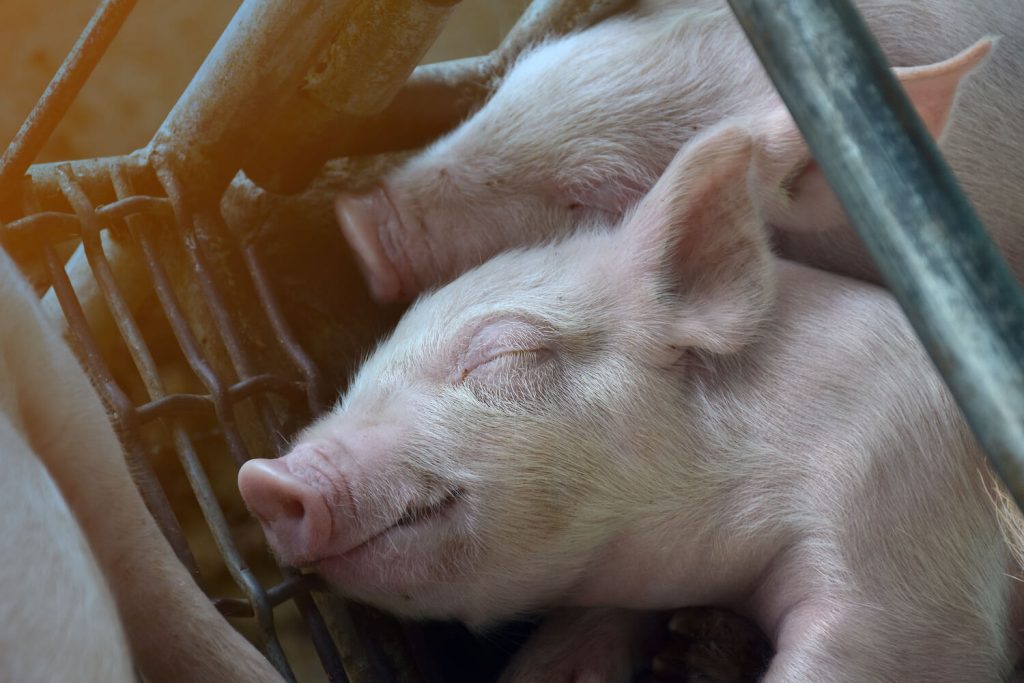Farm animals today don’t have it so good.
For most, life is unthinkable torture in the most literal sense–wings and tails docked without anesthesia, living in hot, crammed, and stench-filled sheds along with thousands of others. Babies torn from their mothers just hours after birth, and the unmistakable screams of their fellow prisoners as they meet their inevitable fate on the slaughter line.
This is how most livestock animals live and die, never mind the bucolic images still plastered all over meat, milk, and egg labels, or the meaningless unregulated claims like “cage-free”, “natural”, or “grass-fed”. More than 55 billion animals were raised for food on the planet this year (not including fish), with the vast majority suffering in factory farms so awful it’s too hard to imagine unless you’ve stood inside one. Then, of course, it’s impossible to forget.

What are certified organic meat, eggs, and dairy products?
For a few farm animals — a minuscule number who fall under the USDA certified organic label — things are supposed to be different. Even though sales of certified organic food make up just about five percent of total U.S. food sales — meat, fish, and poultry represents just three percent of that small organic market (so three percent of the organic industry’s five percent of the total food market). Fresh fruits and vegetables make up more than half of all organic sales, and organic dairy comes in at 15 percent. In other words, there’s a really, really small amount of animals being raised organically.
Still, for the few animals given that privilege, that means a few things, namely the absence of medically important antibiotics, organic feed instead of the GMO and pesticide or herbicide sprayed soy and corn, and, most meaningful to the animals: access to the outdoors–something most farm animals never experience except on the way to slaughter.
And while there are these small differences, stronger animal welfare standards in the organic segment, known as the Organic Livestock and Poultry Practices (OLPP), were set to take effect next spring after being delayed three times. The OLPP would have granted animals natural behavior opportunities (like a chicken being allowed to spread a wing inside her cage), more access to outdoor space, improved transportation regulations, and enforced humane slaughter rules. But the Trump administration reversed the ruling last week, narrowing the already fine line between how conventional and organic animals are raised.
Already there are companies like Aurora Dairy in Colorado that regularly skirt the organic regulations for livestock, despite efforts by watchdog groups to have the company’s certification revoked. And under the Trump decision, so-called “organic” farms will be allowed to revert to cramming hens together in small, painful cages, confining pregnant sows, and dairy cows will still be forced to part with the milk they produced for their baby calfs so American consumers can feel good about feeding their children “certified organic” milk.
“We are gravely disappointed in the administration’s recent decision to gut USDA Organic standards guaranteeing animals minimum amounts of space, light and access to the outdoors,” the vegan Dr. Bronner’s soap company said on its Facebook page.
“This decision not only dilutes the integrity of the USDA Organic label—which consumers rely on to avoid supporting catastrophic & inhumane factory farming practices—but also regresses critical animal welfare standards that a majority of Americans have expressed they want.”

Does certified organic really matter?
The short answer? Yes. Organic food production matters for the health of the planet — healthier soil where crops are grown (all livestock eat crops), healthier ecosystems, healthier consumers, and healthier farmers. And when farm animals are raised truly organically like those bucolic food labels tell us they are — given access to pasture, grazing, and opportunities to bond with babies — it’s a much better life for the animals than the alternative.
But if making the best decision for the animals is the driving force behind an organic meat (or egg, or milk purchase), then the answer is actually No, organic doesn’t matter at all, especially if producers take advantage of the repeal of OLPP and subject the animals to the approved limitations, which only means more suffering.
The answer is also No because in the end, taking an animal’s life isn’t necessary to enjoy the foods we’ve so long relied on them to produce. The answer is No because there are Beyond Burgers and Field Roast sausages that taste like meat but spare the heart disease, obesity, and cancer. The answer is No because certified organic means nothing to a sow — who’s as smart as your dog, by the way — as her piglets are taken away from her before she’s had a chance to nuzzle them in their ears, watch them play, or lay still as they sleep on her belly.
Opting for fruits, veggies, beans, grains, nuts, and seeds instead of animal products not only supports a healthier planet and healthier communities by the reduced intake of animal products (and reduced GHGs, soil, air, and water pollution as a result), but it also sends an important message to the food industry: It says the lives of our fellow earthlings matter more than profits; more than a few nuggets. That better, healthier, and more promising food choices are all around us. And that if labels were to truly reflect the horrors all farm animals endure — organic or not– they’d read a whole lot differently.
Image Credit: Shutterstock


